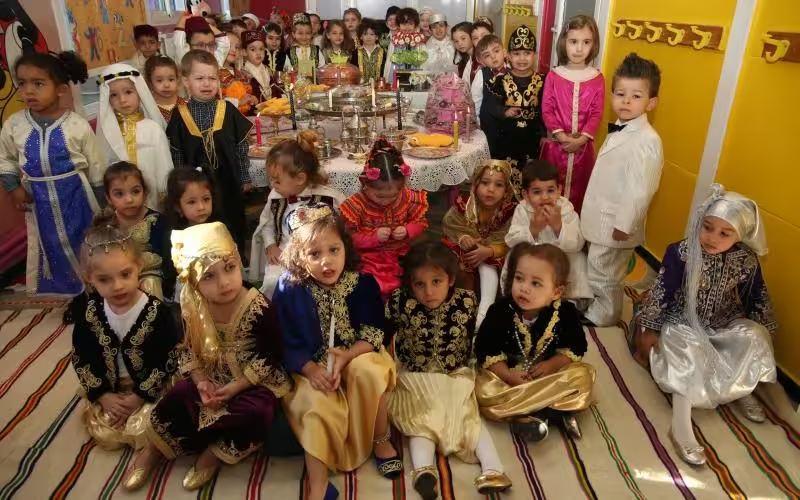Mawlid Ennabaoui in Algeria — A Nation’s Faith, Memory and Culinary Pageant
✍️ BY: Dr. Hana Saada
Algiers – September 2025 – As Algeria is once again marking Mawlid Ennabaoui — the birth of the Prophet Muhammad (PBUH) — the country unfolds a multilayered celebration that is at once devotional, cultural, historical and intensely local. Far from a mere liturgical date on the calendar, Mawlid in Algeria is an annual palimpsest: it writes together piety and popular custom, Sufi meditation and Andalusian chant, rural rites and urban spectacles, family hospitality and communal generosity. This year’s observances confirm what generations have known — that the celebration is a living archive of Algerian identity.
A festival of history and resistance
The rituals of Mawlid in Algeria carry deep historical resonance. During the colonial era religious festivals were not only expressions of faith but also quiet acts of cultural resistance: mosques, zaouias (Sufi lodges) and family gatherings kept language, memory and communal solidarity alive under occupation. That legacy endures. Mawlid remains a moment when the religious and the national intersect: prayer and remembrance merge with public declarations of identity and community resilience.
Two-stage rhythm: birth and the “Sboue”
Traditionally the Mawlid observance unfolds in two linked phases. First comes the public commemoration of the Prophet’s birth: mosque services, naats (praise poems), Qur’anic recitations and sermons that foreground ethics, compassion and the prophetic model of social justice. A week later many communities observe the “Sboue” — a second rite strongly focused on children and young families, featuring blessings, storytelling, gifts for youngsters, and renewed communal meals. In some southern oases the Sboue acquires particular cultural forms — nocturnal vigils, collective recitations and processions that now attract scholarly attention and efforts for cultural safeguarding.
Sufi orders, zaouias and the cadence of devotion
Zaouias and Sufi tariqas remain at the heart of Mawlid in Algeria. From Tlemcen to the Saharan ksours, these centres stage night-long dhikr (remembrance), qasida recitals and devotional songs that fuse theology with local musical idioms. The spiritual register varies — from measured, classical Andalusian performances to vigorous folk invocations — but the aim is uniform: invoking mercy, transmitting devotional knowledge and renewing moral bonds between generations.
Music: from Andalusi malouf to popular chaâbi and folk refrains
Music is omnipresent. Algeria’s rich Andalusian legacy — the malouf and its regional variants — lends solemnity to Mawlid assemblies in Constantine, Tlemcen and Algiers. Elsewhere, chaâbi, popular religious songs and local folk repertoires animate neighbourhood gatherings. In the south, traditional melodies accompany poetic recitations and trance-like chants that marry desert rhythms with spiritual exultation. These musical forms perform two tasks simultaneously: they cultivate reverence and they assert cultural continuity.
Culinary geography: tamina, rechta, trida and southern feasts
If Mawlid is tasted as much as it is heard, the country’s kitchens make eloquent testimony. Across Algeria families prepare signature dishes that vary regionally but share a common logic of abundance and sharing. In Algiers, fine noodles in white sauce — rechta — and sweet breads appear on celebratory tables. In the east, plates of trida and semolina-based specialties recall classical Maghrebi cuisine. In the west, berkoukes in rich red sauce is a favourite; in the Sahara, couscous and camel meat mark the feast with desert flavours. A ubiquitous sweet, tamina (a semolina and honey confection), symbolizes nourishment and joy and is offered to guests and newly circumcised boys. The food is not merely sustenance: it is social currency, distributed to neighbours, the needy and to guests welcomed into Algerian homes.
Rites of passage: circumcision, henna and family solidarity
Mawlid frequently coincides with important family rites — notably the circumcision of boys — and is accompanied by henna ceremonies, traditional dress and public parades. These rites enact belonging: garments, ritual foods and gifts all reaffirm social ties, while mosques and community centres serve as nodes for intergenerational transmission of faith and etiquette.
Public piety and civic life: mosques, talks, competitions
Mosques fill with congregations for special prayers and sermons that underscore ethical teachings and social responsibility. Across cities and towns Quranic recitation competitions and awards for outstanding reciters draw both devotion and civic pride. State and civil institutions often organize conferences, exhibitions and cultural programmes that frame Mawlid as a moment of national reflection on values, education and social cohesion.
Cultural tourism and hospitality — local economies in motion
Mawlid has also become a seasonal boost for local economies. Hotels, guesthouses and host families open their doors to visitors; artisans sell decorative textiles, sweets and incense; cultural centres program public concerts and exhibitions. In regions like Adrar, Béni-Abbès and Tlemcen, visitors come for the distinctive local ceremonies — a form of cultural tourism that revalues memory and creates income for host communities.
Media, photography and modern visibility
While traditional practices endure, Mawlid has adapted to the age of social media and live broadcasting. State media and private outlets stream major events; photographers document zaouia gatherings and family rituals; hashtags and photo galleries circulate images that make local customs visible globally. Digital archiving initiatives — often led by cultural associations and universities — are beginning to catalogue regional variations and oral histories, providing new tools for preservation.
Safeguarding intangible heritage — attention without overstating claims
Certain southern rites associated with Mawlid — their nocturnal recitations, communal meals and unique poetic forms — have attracted the attention of cultural preservationists and researchers. These practices have been the subject of documentation and calls for safeguarding, reflecting rising domestic and international interest in Algeria’s intangible cultural heritage. (Such attention complements local efforts to protect and transmit these traditions to younger generations.)
A unifying festival in a plural society
Mawlid in Algeria is not monolithic; it embraces sectarian, regional and stylistic plurality while sustaining a strong ethic of communal performance. Sunnī jurisprudential currents, Sufi orders, urban cultural elites and rural lineages all find expression in the festival’s variety. This pluralism is at once a source of vitality and a resource for social cohesion — a public pedagogy in shared memory and mutual recognition.
Photos:








📡🌍 | About Dzair Tube Media Group | 🌍📡
━━━━━━━━━━━━━━━━━━━━━━━━━━━━━━━
📰 Dzair Tube is a trailblazer in Algerian digital journalism, delivering high-quality content in Arabic, French, and English. With more than 📈 500,000 daily clicks, it ranks among the most influential media platforms in the country.
🏆 Awarded the President of the Republic’s Prize for Professional Journalist in the Electronic Press category (🗓 October 22, 2022), Dzair Tube is widely recognized for its editorial excellence and integrity.
📱 Massive Digital Reach:
🔴 350,000+ YouTube subscribers
🔵 6 million+ followers across Facebook pages
📸 450,000+ Instagram followers
🎥 Operating from state-of-the-art studios, Dzair Tube broadcasts rich and diverse programming, including:
🗞 News | ⚽ Sports | 🎭 Entertainment | 🕌 Religion | 🎨 Culture
🗣️ Featuring interactive talk shows and exclusive interviews with prominent figures from politics, business, arts, and more, Dzair Tube serves as a key platform for public discourse and civic engagement.
📰 Its print sports daily, “Dzair Sport,” enjoys over 50,000 daily downloads via the official website—further cementing the platform’s multimedia leadership.
🎖️ Honored with the Media Leadership Award by the former Minister of Communication, Mohamed Laâgab, and celebrated at the Hilals of the Television awards, Dzair Tube continues to lead with innovation, influence, and impact.
━━━━━━━━━━━━━━━━━━━━━━━━━━━━━━━
🌐 Stay Connected:
🔗 Website: www.dzair-tube.dz
🔗 English: www.dzair-tube.dz/en
📲 Follow us on Facebook | Instagram | YouTube
━━━━━━━━━━━━━━━━━━━━━━━━━━━━━━━




